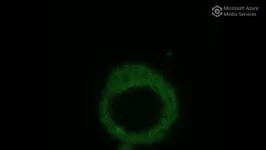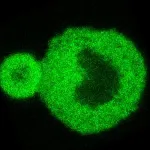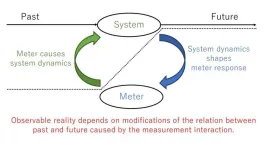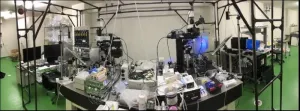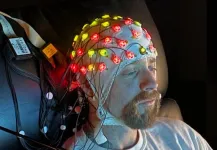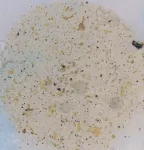(Press-News.org) Many diseases affecting the brain and nervous system are linked to the formation of protein aggregates, or solid condensates, in cells from their liquid form condensate, but little is known about this process.
This liquid-to-solid transition can trigger the formation of what are called amyloid fibrils. These can further form plaques in neurons causing neurodegenerative diseases such as Alzheimer's.
Biomedical engineers at the University of Sydney, in collaboration with scientists at the University of Cambridge and Harvard University, have now developed sophisticated optical techniques to monitor at close range the process by which these protein aggregates form.
By testing a protein associated with Amyotrophic Lateral Sclerosis – ALS disease, which affected astrophysicist Professor Stephen Hawking – the Sydney engineers closely monitored the transition of this protein from its liquid to solid phase.
“This is a huge step forward to understanding how neurogenerative diseases develop from a fundamental perspective,” said Dr Yi Shen, lead author of the research published in the Proceedings of the National Academy of Sciences (PNAS) in the United States.
“We can now directly observe the transition of these critical proteins from liquid to solid at the nanoscale – a millionth of a metre in scale,” said Dr Daniele Vigolo, a senior lecturer in the School of Biomedical Engineering and a member of the University of Sydney Nano Institute.
Proteins regularly form condensates during liquid-to-liquid phase separation in a wide range of critical and healthy biological functions, such as the formation of human embryos. This process assists biochemical reactions where protein concentrations are critical and also promotes healthy protein–protein interactions.
“However, this process also increases the risk of dysfunctional aggregation, where unhealthy aggregates of solid proteins form in human cells,” said Dr Shen, who is an ARC DECRA Fellow in the School of Chemical and Biomolecular Engineering and also a member of Sydney Nano.
“This can lead to aberrant structures associated with neurodegenerative diseases because the proteins no longer exhibit rapid reversibility back to liquid form. It is therefore crucial to monitor condensate dynamics, as they directly affect pathological states,” she said.
The world-first nanoscale optical observation of this process has allowed the team to determine that the transition from liquid to solid protein starts at the interface of the protein condensates. This window onto the phase transition also revealed that the internal structures of these protein agglomerates are heterogenous, where previously they were thought to be homogeneous.
Dr Vigolo said: “Our findings promise to greatly improve our understanding of neurogenerative diseases from a fundamental perspective.
“This means a promising new area of research to better understand how Alzheimer’s disease and ALS develops in the brain, affecting millions of people worldwide.”
### ends ###
DOWNLOAD photos and a short video of the condensate process at this link.
YouTube: short clip of condensate interaction at this link.
INTERVIEWS
Dr Daniele Vigolo Dr Yi Shen
School of Biomedical Engineering School of Chemical and Biomolecular Engineering
Faculty of Engineering Faculty of Engineering
The University of Sydney The University of Sydney
daniele.vigolo@sydney.edu.au yi.shen@sydney.edu.au
MEDIA ENQUIRIES
Marcus Strom | +61 423 982 485 | marcus.strom@sydney.edu.au
DECLARATION
The authors declare no competing interests.
This work is supported by the Newman Foundation, the Wellcome Trust, ERC, US Alzheimer Association Zenith, ALS Canada–Brain Canada, Canadian Institutes of Health Research and the Cambridge Centre for Misfolding Diseases. Canadian Institutes of Health Research, Alzheimer Society of Ontario Chair in Alzheimer’s Disease Research; US National Institute of Aging. Researchers acknowledge the Cambridge Advanced Imaging Centre and K.H. Muller for help with flash-freezing and SEM imaging.
END
When proteins get stuck at solid: unlocking the secrets to brain diseases
Nanoscale view of proteins opens window to treat neurodegenerative illness
2023-08-24
ELSE PRESS RELEASES FROM THIS DATE:
NPS professor’s DURIP award will take quantum research to new heights
2023-08-24
Naval Postgraduate School (NPS) Professor Dr. Frank Narducci, Chair of the Department of Physics, received a Defense University Research Instrumentation Program (DURIP) award to build what could become the most precise atomic instrument of its kind for applications to quantum sensing experiments in navigation and timekeeping.
Called an atomic tower, the instrument is expected to have unprecedented sensitivity to acceleration and rotation measurements due to its unprecedented height. NPS research utilizing this instrument has many applications of interest to the Department of the Navy, Narducci explained.
“Most immediately ...
Griffith on the cusp of a new vaccine modality breakthrough
2023-08-24
Griffith University researchers are on the brink of a technological breakthrough in vaccine development with a possible new vaccine modality.
Professor Bernd Rehm and Dr Shuxiong Chen from the Griffith Institute for Drug Discovery (GRIDD) and Griffith’s Centre for Cell Factories and Biopolymers have succeeded in developing a new vaccine modality that is a stable particulate vaccine.
The new vaccine modality is at proof-of-concept stage and in early development.
To demonstrate this vaccine approach, it was tested with a more established Griffith vaccine against Strep A that is currently performing strongly in human clinical trials in Canada.
Professor ...
Do measurements produce the reality they show us?
2023-08-24
Whenever the precision of a measurement approaches the uncertainty limit defined by quantum mechanics, the outcomes of the measurement depend on the dynamics of the interactions with the meter used to determine a physical property of the system. This finding may explain why quantum experiments often produce conflicting results and may contradict basic assumptions regarding physical reality.
Two quantum physicists from Hiroshima University recently analyzed the dynamics of a measurement interaction, where the value of a physical property is identified with a quantitative change in the meter state. This is a difficult problem, because quantum theory does not identify the value ...
The mouse metaverse: A tool for understanding the molecular mechanism of autism and the mind
2023-08-24
Autism is difficult to study and more difficult to treat because it is an individual condition lacking precise quantification. The development of mouse models of human mental disorders has proven a tractable approach to studying the molecular mechanisms, a new review argues and highlights the current state of the art in autism research.
Whether or not the autism spectrum is a disorder to be treated or a disability to be accommodated is debated by experts. This, however, is symptomatic for the fact that it is a very individual condition that has many expressions as well as causes, with no quantitative evaluation system or objective, mechanized diagnostic method. This makes ...
New ‘verbal treasure trove’ dictionary captures nuances and uses of Shakespeare’s words
2023-08-24
William Shakespeare used the word dotage to capture reduced mental ability (as in being blindly in love) rather than as a quaint term for old age, successes were really outcomes – one could talk of a ‘bad success’ – and, it turns out, the word bastard back then most often referred to a flower that was genetically hybrid.
A new dictionary, a verbal treasure trove of the nuances and uses of Shakespeare’s words, is published this week.
While dinner was preferred by Shakespeare for what we might think of as lunch (although his contemporaries used it to refer to an evening meal), beef, as today, was strongly associated with the English, but particularly the lower ...
Breast cancer study altered guidelines in Sweden
2023-08-24
BRCA1 and BRCA2 are well-known breast cancer genes associated with a significantly increased risk of hereditary breast and ovarian cancer. However, there are an additional eleven genes associated with elevated risk for these types of cancer. A multi-year Swedish study now reveals that the proportion of women with genetically confirmed hereditary breast cancer doubled by including all genes in the screening test.
In a Swedish research study including patients between 2012 and 2018, all cancer genetic clinics in Sweden participated. A total of 4759 individuals underwent comprehensive ...
Researchers to probe brain mechanisms behind free will
2023-08-24
Picture this scenario: You and a friend are walking around your neighborhood when you stop at a crosswalk. As you wait, the noises of the world and your internal thoughts all vie for your attention. Suddenly, you see a motorist nearly hit a bicyclist.
“Whoa, did you see that?” you say to your friend.
“I sure did; that was a fully restored 1967 Ford Mustang,” your friend replies, referring to a car separate from the near-traffic collision.
Despite being in the same place at the same time, and looking at the same scene, you and your friend paid attention to different things.
Why? ...
Blink and you'll miss these plants shooting their seeds
2023-08-24
DURHAM, N.C. -- If you happened upon a witch hazel plant in the forest, you might describe it as a sweet-smelling shrub with crinkly ribbon-like petals. But to Duke University graduate student Justin Jorge, it’s a howitzer.
That’s because of the impressive firepower of its fruits.
When witch hazels are ready to disperse their seeds, their woody seed capsules split open. Pressure builds up, and eventually the seeds shoot out like bullets fired from a rifle, hitting 30 feet per second in about half a millisecond.
“If you blink you’ll miss it,” said Jorge, who worked on this project as part of his Ph.D. thesis in biomechanics with senior author ...
Could microplastics in soil introduce drug-resistant superbugs to the food supply?
2023-08-24
URBANA, Ill. — Like every industry, modern farming relies heavily on plastics. Think plastic mulch lining vegetable beds, PVC pipes draining water from fields, polyethylene covering high tunnels, and plastic seed, fertilizer, and herbicide packaging, to name a few. In a new review article, University of Illinois Urbana-Champaign researchers say these plastics are now widely dispersed in agricultural soils in the form of microplastics and nanoplastics.
That’s not necessarily new; microplastics have been found in nearly every ...
Heavy drinking, handgun-carrying linked among rural youth
2023-08-24
In the rural United States, an adolescent who drinks heavily has a 43% greater probability of carrying a handgun in the following year, according to a study published this month in The Journal of Rural Health.
“While there has been a lot of research on this correlation in urban areas, little is known about the association between alcohol use, particularly heavy drinking, and handgun carrying in rural areas,” said lead author Alice Ellyson, an acting assistant professor of pediatrics at the University of Washington School of Medicine and investigator in UW Medicine's Firearm Injury & Policy Research Program.
“Our study ...
LAST 30 PRESS RELEASES:
New study from Jeonbuk National University finds current climate pledges may miss Paris targets
Theoretical principles of band structure manipulation in strongly correlated insulators with spin and charge perturbations
A CNIC study shows that the heart can be protected during chemotherapy without reducing antitumor efficacy
Mayo Clinic study finds single dose of non-prescribed Adderall raises blood pressure and heart rate in healthy young adults
Engineered immune cells show promise against brain metastases in preclinical study
Improved EV battery technology will outmatch degradation from climate change
AI cancer tools risk “shortcut learning” rather than detecting true biology
Painless skin patch offers new way to monitor immune health
Children with poor oral health more often develop cardiovascular disease as adults
GLP-1 drugs associated with reduced need for emergency care for migraine
New knowledge on heritability paves the way for better treatment of people with chronic inflammatory bowel disease
Under the Lens: Microbiologists Nicola Holden and Gil Domingue weigh in on the raw milk debate
Science reveals why you can’t resist a snack – even when you’re full
Kidney cancer study finds belzutifan plus pembrolizumab post-surgery helps patients at high risk for relapse stay cancer-free longer
Alkali cation effects in electrochemical carbon dioxide reduction
Test platforms for charging wireless cars now fit on a bench
$3 million NIH grant funds national study of Medicare Advantage’s benefit expansion into social supports
Amplified Sciences achieves CAP accreditation for cutting-edge diagnostic lab
Fred Hutch announces 12 recipients of the annual Harold M. Weintraub Graduate Student Award
Native forest litter helps rebuild soil life in post-mining landscapes
Mountain soils in arid regions may emit more greenhouse gas as climate shifts, new study finds
Pairing biochar with other soil amendments could unlock stronger gains in soil health
Why do we get a skip in our step when we’re happy? Thank dopamine
UC Irvine scientists uncover cellular mechanism behind muscle repair
Platform to map living brain noninvasively takes next big step
Stress-testing the Cascadia Subduction Zone reveals variability that could impact how earthquakes spread
We may be underestimating the true carbon cost of northern wildfires
Blood test predicts which bladder cancer patients may safely skip surgery
Kennesaw State's Vijay Anand honored as National Academy of Inventors Senior Member
Recovery from whaling reveals the role of age in Humpback reproduction
[Press-News.org] When proteins get stuck at solid: unlocking the secrets to brain diseasesNanoscale view of proteins opens window to treat neurodegenerative illness
